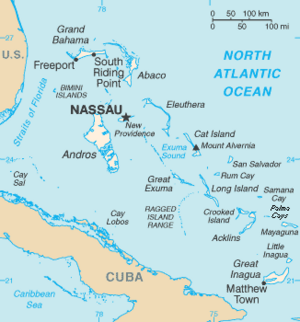Capture of The Bahamas (1782)
| Capture of the Bahamas | |||||||
|---|---|---|---|---|---|---|---|
| Part of the Anglo-Spanish War | |||||||
 Map of the Bahamas |
|||||||
|
|||||||
| Belligerents | |||||||
|
|
|
||||||
| Commanders and leaders | |||||||
|
|
|
||||||
| Strength | |||||||
| +1400 defenders | 59 ships 1500 sailors 1588 regulars 50 light infantry 202 militia |
||||||
| Casualties and losses | |||||||
| 1,412 captured 77 merchant ships captured 1 frigate captured 4 brigantines captured 5 schooners captured 2 sloops captured 11 privateer ships captured |
None | ||||||
The Capture of the Bahamas took place in May 1782 during the Anglo-Spanish War when a Spanish force under the command of Juan Manuel de Cagigal arrived on the island of New Providence near Nassau, the capital of the Bahamas. The British commander at Nassau, John Maxwell decided to surrender the island without a fight when confronted by the superior force.
Spain had entered the American War of Independence in 1779 and launched a campaign to drive the British out of the Gulf of Mexico overrunning the British colony of West Florida and seizing its major outposts at Mobile and Pensacola. The Spanish commander Bernardo de Gálvez planned an attack against Nassau, the capital of the Bahamas which served as a major British privateering base. Gálvez authorised an expedition against the islands in late 1781, but this was postponed during the Yorktown Campaign which led to the surrender of a British army in October 1781. In early 1782 the scheme was revived and command of it was given to Juan Cagigal, the Governor of Havana.
In spite of receiving orders from Gálvez to abandon the expedition scheme so his forces could be used for an invasion of Jamaica, Cagigal pressed ahead with his scheme and sailed from Havana on 18 April 1782. He had 2,500 troops which had left the garrison of Havana very low, and unable to send troops to support Gálvez's Jamaican expedition. He had managed to secure additional ships and transport from American privateers led by Alexander Gillon.
...
Wikipedia
